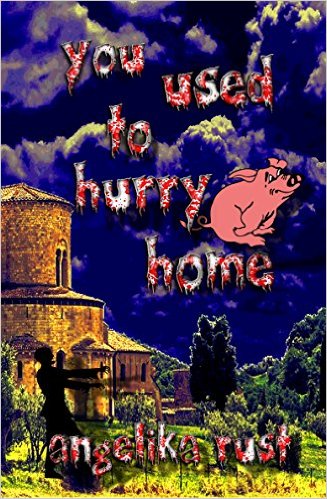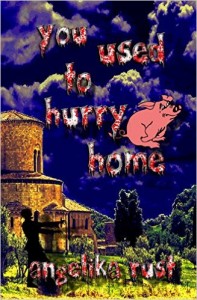You Used To Hurry Home by Angelika Rust
-Reviewed by Bridey Heing–
In her latest independently published fantasy tale, Angelika Rust brings about the apocalypse. In the story, a hapless writer named Francis accidentally agrees to bring about the end of time when his shotgun marriage turns sour, which kicks off a string of events that lands Francis, his wife, and his muse in front of God himself.
The premise is interesting, but the writing falls short. You Used To Hurry Home is a brief novella, although chalking up the lack of character development or logical series of events to lack of space seems too generous. The story is rushed, leaning heavily on gimmicks and tropes to push the narrative towards the end of the world.
Francis is a writer struggling with writer’s block, but when he appeals to the heavens for a muse, he’s sent Ntropi. Ntropi leaves him tongue-tied, and won’t be leaving his side until he writes a masterpiece. Although Ntropi arrives in the first few pages, she doesn’t have much to do until the very end of the book, other than giggle and wag her finger at Francis. But she’s not the only woman Francis has in his life; after a drunken tryst at a friend’s wedding in Italy, Francis finds himself married by force to Francesca, the daughter of a mafia boss. Back in Francis’ home-city of Vienna, they go about making a life together in the same building as a quirky elderly woman dubbed “The Pig Woman” due to the stuffed piglet she carries around. Only when the world is ending does Francis learn she’s actually the mythical Kassandra.
Throughout the story, Francis plays the passive main character. He seems to have no agency whatsoever, serving as just a pawn to be moved around the board by outside forces. He’s pushed into marriage with, apparently, no recourse or inclination to question it. When his new wife begins pressuring him to buy new furniture and get a job at a call center, he bends to meet her every wish for no clear reason other than keeping the peace. He’s pulled and pushed along, and is an entirely unsympathetic protagonist.
For their part, the women in the story are well-worn tropes. Ntropi is a manic-pixie-dream-muse, playing no part in the bulk of the story other than making Francis look like he’s talking to himself and making him stammer. Francesca is a spoiled young woman born into wealth who demands Francis’ time and attention, but seems to have no actual personality of her own. Kassandra is played strictly for comic relief, an eccentric old woman who speaks in a hard to decipher accent for no reason. Even the portrayal of God, cast here as every major deity in world history, is rushed and inexplicably casual.
The dialogue throughout is laced with ‘Er’ and ‘Tee-hee’, and a recurring gimmick has the main characters speaking in lines from classic rock songs. None of it feels natural or realistic, and a complete lack of character depth leaves much to be desired. What could have been an engaging little book is instead a disappointment.




